Every day, startup founders make dozens of decisions that can make or break their business. The right knowledge often means the difference between doing well and just getting by.
The best books for founders, as recommended by seasoned business owners, offer shortcuts through common traps. They show why so many startups fail in their early days.
Learning from others’ experiences helps you avoid expensive mistakes. This can save you months (or even years) of painful trial and error.
The business-building journey doesn’t have to feel so lonely when you have proven wisdom to guide you. Reading creates mental frameworks (structured ways of thinking) for handling tough business problems well.
Successful founders often point to certain books as game-changers for their growth and peace of mind while building their companies.
This hand-picked collection focuses on practical advice for real-world challenges. It covers everything from smart planning to day-to-day operations.
Key Takeaways
We’ve organized key business knowledge into six focused areas. Instead of drowning you in hundreds of choices, we picked the most useful books that tackle the main problems every business owner faces.
The books also cover hands-on management methods, tested sales and marketing approaches, and day-to-day operations guidance. All of this comes from business owners who have already walked this path and succeeded.
What this list will give you:
- Proven strategies to avoid the most common startup pitfalls that cause 90% of new businesses to fail
- Mental frameworks from successful entrepreneurs to make better decisions under pressure
- Practical tools for building and managing high-performing teams
- Step-by-step guidance for customer acquisition and revenue growth
- Free resources to implement growth strategies without draining your budget
How the categories work:
- Strategic Business Thinking – Big picture frameworks for market positioning and competitive advantage
- Mindset and Resilience – Psychological tools to handle setbacks and maintain focus during tough times
- Management and Leadership – Practical approaches for building and leading effective teams
- Sales and Marketing – Proven methods for customer acquisition and sustainable revenue growth
- Practical Operations – Day-to-day execution strategies and operational frameworks
- Startup Growth – More than just maintaining your business, every startup’s goal is growth, and these are your essential resources to achieve that
Why Reading Matters for Founders
Running a startup brings daily obstacles and stress. Many founders find helpful practices like meditation to stay grounded during tough times.
Reading takes this mindset work further by introducing proven strategies from those who’ve succeeded before you, including lessons from visionaries like Steve Jobs who built revolutionary startups.
When you share book insights with your team, you create a culture of growth and help avoid the five dysfunctions that hurt many companies (we’ll talk about this more later).
Teams become more creative when they’re exposed to fresh ideas from industry experts. This knowledge-sharing builds stronger, more innovative companies and improves leadership throughout your organization.
Best Books for Founders That Every Startup Team Should Read
To help you find your way through the huge world of business books, we’ve sorted key readings into groups. These groups tackle the main challenges that business owners face.
Each book gives you actionable insights from experts who’ve mastered specific parts of building winning companies.
Strategic Business Thinking
Building a successful startup requires strategic vision (long-term planning with clear goals) and market awareness.
These books offer frameworks for spotting opportunities and developing new business models. They also help you navigate competitive landscapes (understanding your competition and market position).
These books help founders make better choices about product development, market positioning, and growth strategies.
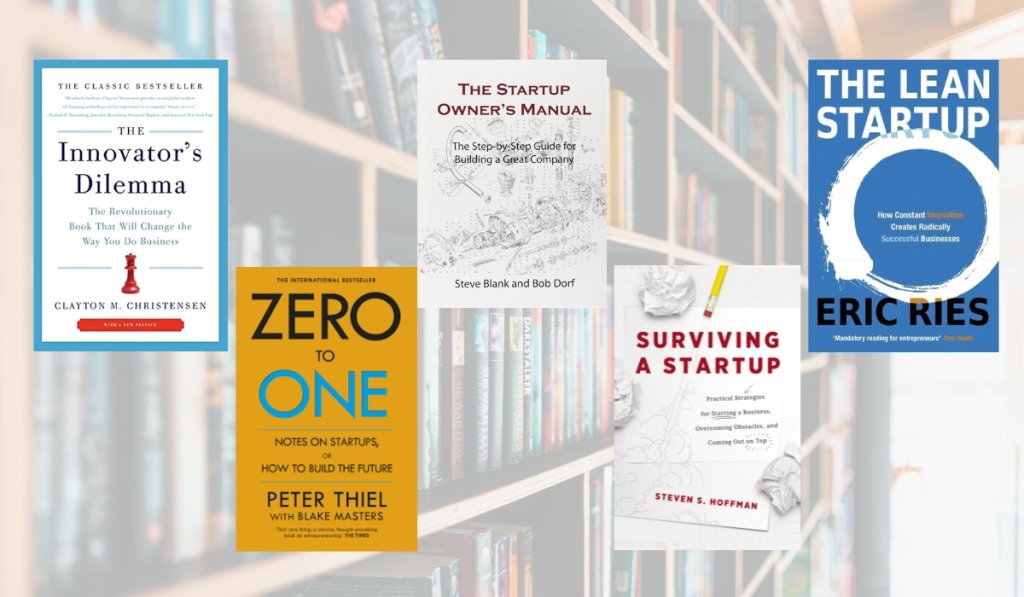
“The Innovator’s Dilemma“ written by Clayton Christensen explores how technology shifts impact business success.
Christensen explains why leading companies often fail when market disruptions (major changes that shake up an industry) occur. His insights help founders prepare for inevitable industry changes and identify potential direct competitors.
Peter Thiel and Blake Masters, who authored “Zero to One,” show how to build truly groundbreaking businesses.
Thiel distinguishes between copying existing ideas and creating something new. His philosophy centers on finding unique opportunities others have missed—turning good ideas into revolutionary products.
Key insights include: the most successful companies first take over a specific niche market before expanding. They focus on product strength rather than marketing from the start.
Every monopoly gains its position by solving a unique problem. Meanwhile, businesses fail for the same reason—they can’t escape competition.
“The Lean Startup“ written by Eric Ries introduces the lean startup methodology (a systematic approach to building businesses). This method has changed how founders approach product development.
The book focuses on validated learning (testing ideas with real data), scientific experimentation, and iterative product releases (releasing improved versions step by step). This approach shortens development cycles and measures actual progress.
Ries emphasizes customer feedback and the minimum viable product concept (MVP – the simplest version of a product that still works). This helps founders avoid building products nobody wants.
Steve Blank who wrote “The Startup Owner’s Manual“ provides a step-by-step guide for building successful companies.
This detailed resource walks founders through customer development. It also offers valuable templates for business planning. Blank’s thorough approach helps business owners validate their ideas before scaling.
“Surviving a Startup“ authored by Steven Hoffman addresses the practical challenges that business owners face when building new ventures. Hoffman highlights the critical difference between “essentials” and “goodies” in product development.
He notes that for B2B products (business-to-business products sold to other companies), alignment with clients’ top five priorities is crucial for adoption.
He also emphasizes that building trust quickly through authentic storytelling reveals your values and motivations. This connects your purpose to wider impact.
Mindset and Resilience
The business-building path is filled with challenges that test your resolve and mental strength.
These books focus on developing the psychological toughness needed to push through setbacks. They help you manage stress and maintain vision during difficult times.
These books offer perspectives on turning obstacles into opportunities and building the resilience essential for long-term success.
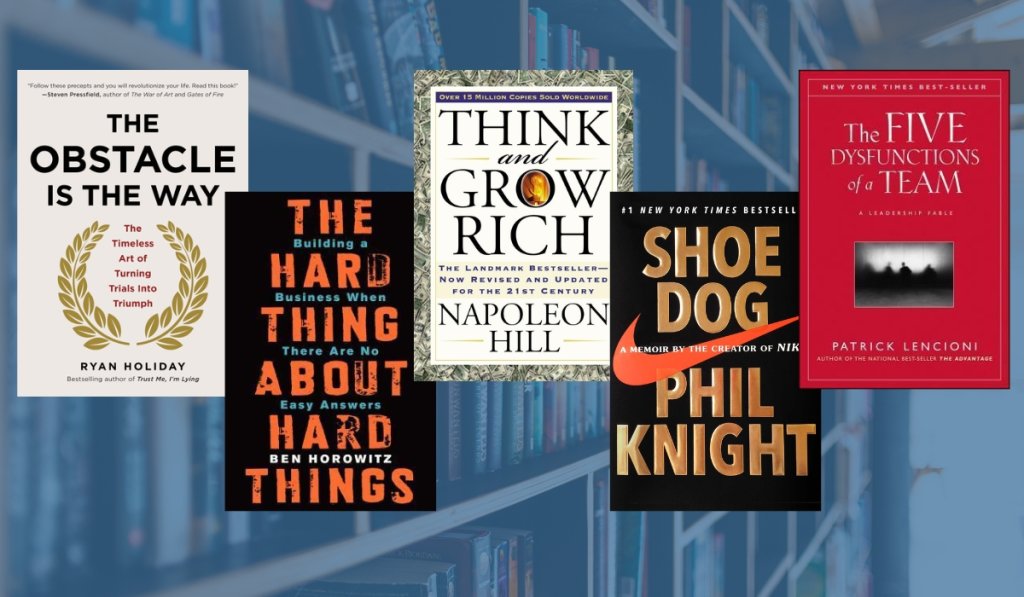
Ryan Holiday, who authored “The Obstacle Is the Way,” draws wisdom from ancient Stoic philosophy (a practical approach to handling life’s challenges).
Holiday demonstrates how challenges become opportunities for growth. This perspective helps founders persevere through startup difficulties and maintain focus during challenging times.
“The Hard Thing About Hard Things“ written by Ben Horowitz tackles tough management decisions. Horowitz shares lessons from his experiences leading troubled companies.
His advice covers situations business schools rarely address. This makes it a must-read for anyone navigating the complex world of startups.
Phil Knight who wrote “Shoe Dog“ tells the compelling story behind Nike’s creation. This memoir reveals the numerous setbacks Knight faced while building one of the world’s most recognized brands.
Founders will find inspiration in Knight’s persistence through countless obstacles in Nike’s early stages.
“Think and Grow Rich“ authored by Napoleon Hill examines the habits of highly effective people who achieved extraordinary success.
Hill’s principles on goal setting and positive thinking have guided business owners for generations. This classic emphasizes that startup success often begins with the right mindset.
Patrick Lencioni who wrote “The Five Dysfunctions of a Team“ reveals the core issues that undermine team effectiveness.
Through a leadership fable, Lencioni identifies five connected problems: absence of trust, fear of conflict, lack of commitment, avoidance of accountability, and inattention to results.
The book provides practical approaches to overcome these dysfunctions. It helps build cohesive, high-performing teams essential for startup success.
Management and Leadership
Effective leadership is critical for turning vision into reality. These books provide frameworks for building and managing teams that execute efficiently while maintaining organizational health.
From daily operations to strategic decision-making, these resources help founders develop the management skills required for sustainable growth.
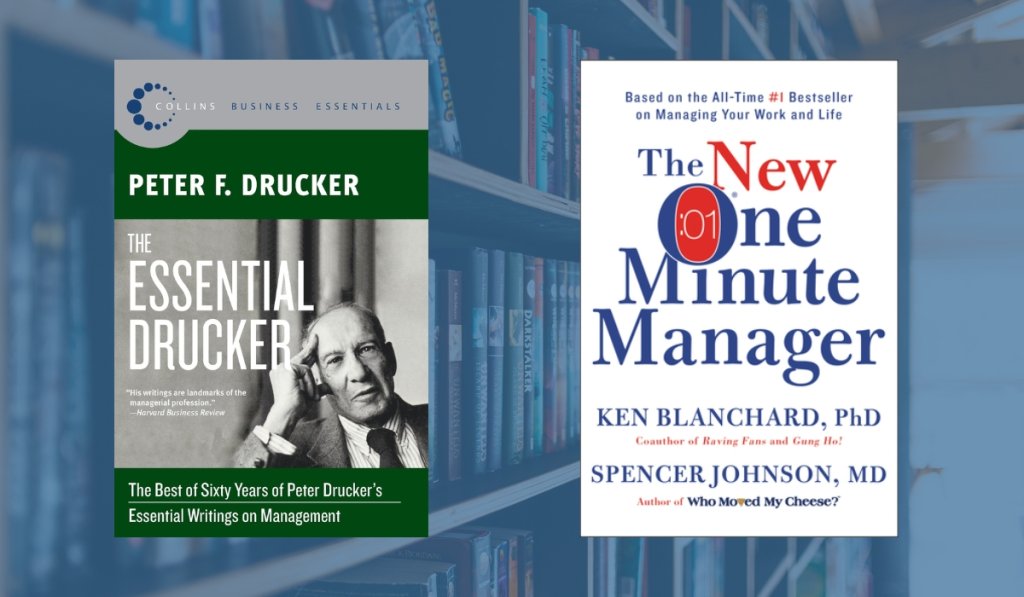
“The Essential Drucker“ authored by Peter Drucker distills the wisdom of management’s foremost thinker into practical insights.
Drucker asserts that management’s goal is enabling ordinary people to achieve extraordinary results through thoughtful decision-making. He emphasizes that while intelligence is valuable, execution ultimately determines success.
Perhaps most importantly, he identifies time as the most precious resource. This makes the exchange of money for time an appropriate trade for busy founders.
Ken Blanchard who wrote “The New One Minute Manager“ offers a concise approach to effective management through three simple practices.
These include one-minute goals (defining clear, measurable objectives in 250 words or less). There are also one-minute praisings (immediately acknowledging specific positive actions and their impact).
Finally, there are one-minute redirects, promptly addressing errors while maintaining confidence.
This streamlined methodology is particularly valuable for time-constrained startup founders.
Sales and Marketing
Even the best products don’t sell themselves. These books help founders develop effective strategies for reaching customers and scaling distribution channels (ways to get products to customers). They also help create sustainable revenue streams.
These books provide frameworks for understanding market dynamics (how markets work and change) and building sales processes that drive consistent growth.
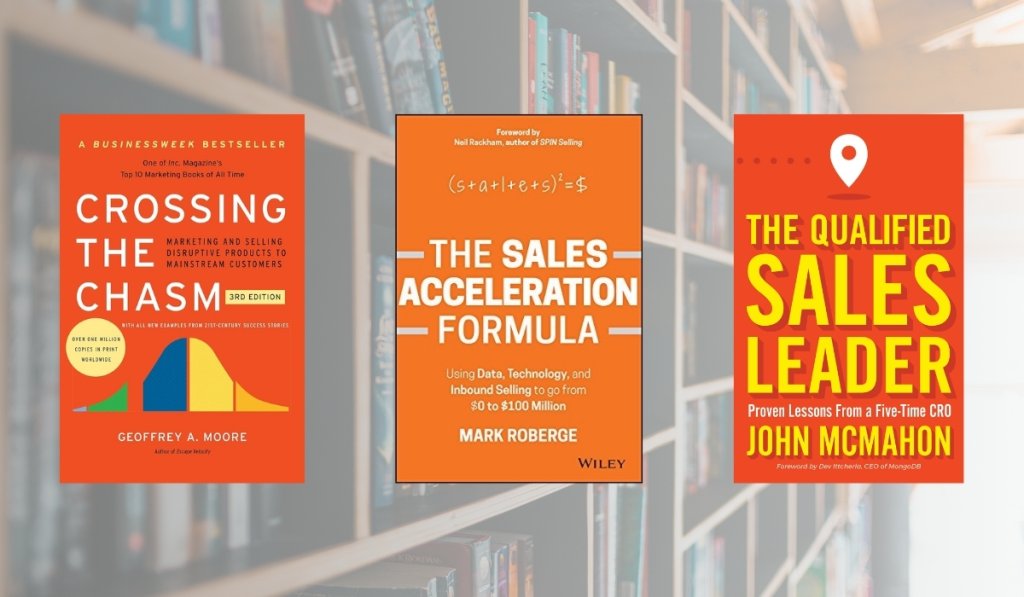
Geoffrey Moore who authored “Crossing the Chasm“ addresses the challenges of marketing disruptive products (products that change how industries work). Moore explains the gap between early adopters (first customers who try new products) and the mainstream market.
This gap causes many promising startups to fail. His framework helps founders create strategies for reaching broader customer segments.
Key insights include positioning yourself as a market leader in your niche by making a strong claim. He also notes that positioning isn’t just about making products easier to sell—it’s about making them easier to buy.
“The Sales Acceleration Formula“ written by Mark Roberge reveals the systematic approach that helped HubSpot achieve remarkable growth. Roberge emphasizes that world-class sales hiring is the biggest driver of sales success. He notes that each salesperson brings distinct skills or “superpowers” to the team.
He advocates using quantifiable metrics (measurable data points) to track performance throughout each stage of the sales funnel (the process customers go through from first contact to purchase). This creates a data-driven approach to revenue generation.
John McMahon who wrote “The Qualified Sales Leader“ has been recommended by multiple successful founders as essential reading for building effective sales organizations.
McMahon provides frameworks for scaling sales teams and creating predictable revenue growth. This is particularly valuable for startups transitioning from founder-led sales to building professional sales organizations.
Practical Operations
Beyond vision and mindset, startups require effective execution and operational excellence. These books deliver actionable frameworks for day-to-day business operations, from raising capital to product development.
They address the nuts and bolts of building functional companies with efficient processes, effective team structures, and sustainable growth mechanisms.
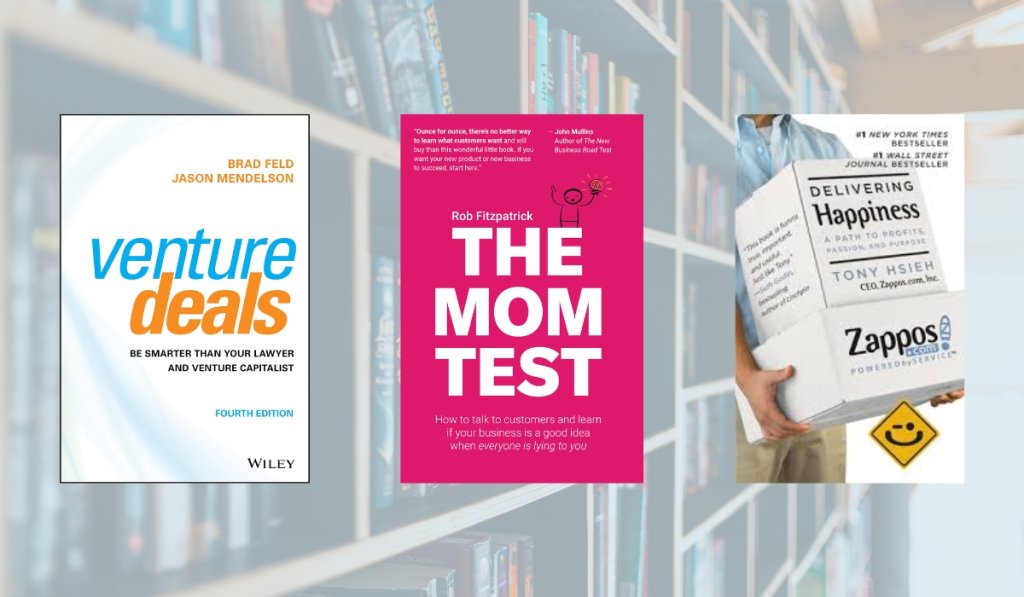
“Venture Deals” by Brad Feld provides essential knowledge for founders seeking venture capital (investment money from professional investors). This book makes term sheets easier to understand. Term sheets are legal documents that outline investment terms.
The book also explains financing options and what venture capitalists look for in potential investments. Understanding these concepts helps founders secure better deals when raising money.
“The Mom Test” by Rob Fitzpatrick explains how to talk to customers and gather genuine feedback. Fitzpatrick shows why typical customer conversations often lead to misleading information.
He shows how to conduct interviews that reveal actionable insights (useful information you can act on). This approach helps validate business ideas early in the development process.
“Delivering Happiness” by Tony Hsieh chronicles how Zappos created an exceptional company culture. Hsieh demonstrates how prioritizing customer service and employee satisfaction drives long-term business success.
His insights help founders build organizations where both customers and team members thrive.
Resources for Startup Growth
Some of these valuable resources are available as free downloads. This makes them accessible to bootstrapped founders (entrepreneurs funding their own businesses) who need practical guidance without the expense.
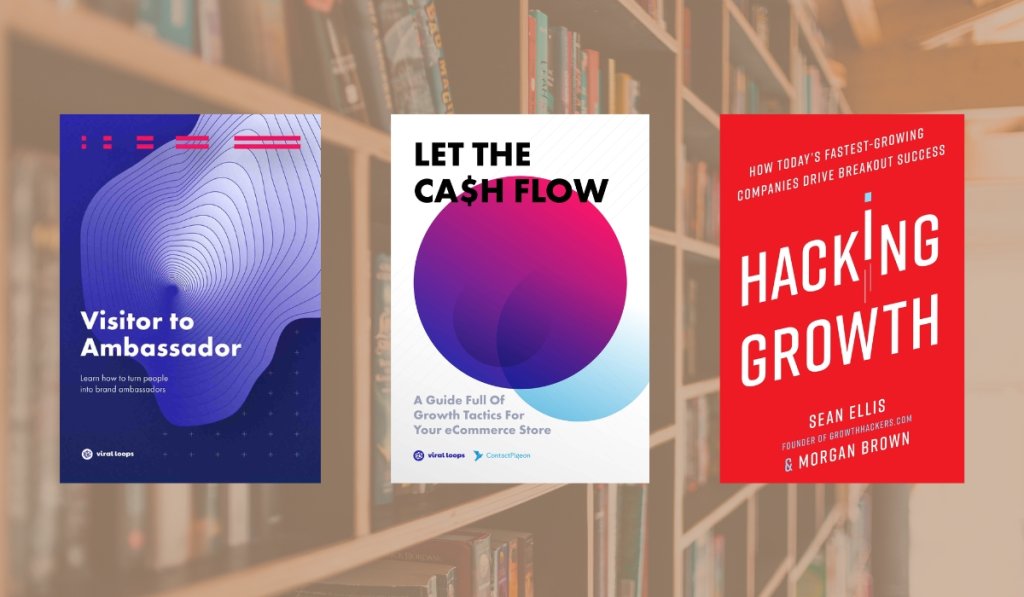
“From Visitor to Ambassador“ provides a step-by-step playbook for creating successful referral marketing campaigns from scratch.
This guide by Viral Loops teaches founders how to transform casual users into dedicated promoters. It uses the Milestone concept, which means rewarding customers at specific achievement points.
The tactics apply across all viral and referral marketing campaigns regardless of platform choice. This makes it particularly valuable for startups looking to achieve organic growth through word-of-mouth marketing. This approach works well without large advertising budgets.
“Let The Ca$h Flow“ helps founders understand what makes or breaks an eCommerce store (online business that sells products). It presents effective customer retention strategies that online businesses can implement immediately.
Readers learn tools and methods for competitive advantage through referral marketing. Successful business owners have used these methods to drive sustainable revenue growth.
This resource (also by Viral Loops) is especially valuable for product-based startups looking to optimize their online sales funnels and build lasting customer relationships.
“Hacking Growth” by Sean Ellis and Morgan Brown documents strategies for achieving rapid growth. The authors present systematic methods for experimentation across marketing, product development, and customer retention.
This methodology has helped numerous companies achieve breakthrough results through focused growth initiatives.
Building a Reading Habit
Knowledge is only valuable when you put it into practice consistently. Developing a sustainable reading routine ensures continuous learning and professional growth.
Here are practical approaches to integrating regular reading into the demanding schedule of startup life, creating both personal and organizational benefits.
Successful founders make reading a consistent practice.
Setting aside even fifteen minutes daily builds knowledge over time. This investment pays dividends through better decision-making, something Peter Drucker emphasized throughout his influential work on management.
Consider creating a company book club for team development. Discussing key concepts strengthens common understanding and shared vocabulary.
Team members can apply lessons directly to current business challenges, fostering an environment where honest feedback becomes possible.
Audio versions make books accessible during commutes or exercise. Digital options allow highlighting and note-taking for future reference.
Physical books remain valuable for deeper focus without digital distractions, as many founders remember reading their most influential books in physical form.
FAQs on Best Book for Startup Founders
What are the best books for startup founders?
The most valuable books cover business strategy, mindset development, and practical operations. “Zero to One” by Peter Thiel and “The Hard Thing About Hard Things” by Ben Horowitz offer exceptional insights.
Other must-read titles include “The Lean Startup” by Eric Ries and “The Startup Owner’s Manual” by Steve Blank. Books that address specific challenges currently facing your startup provide the most immediate value.
What is the best book to read if you want to start a business?
“The $100 Startup” by Chris Guillebeau stands out for new entrepreneurs with limited resources. It offers practical guidance for launching businesses without significant capital investment, featuring real stories of successful businesses started on shoestring budgets.
For a comprehensive approach, “The Startup Owner’s Manual” by Steve Blank provides structured frameworks for business development.
How do I become a good startup founder?
Effective founders combine continuous learning with decisive action based on that knowledge. They develop resilience through challenges while maintaining adaptability to changing conditions.
Regular reading, seeking mentorship, and building diverse teams contribute significantly to founder success. Research on influential entrepreneurs reveals that persistence through failure often distinguishes the most successful founders.
Are startups with two founders more successful?
Research shows startups with co-founders generally outperform solo-founded ventures in growth metrics. Complementary skill sets and shared workload contribute to higher success rates.
However, founder relationship quality matters more than simply having multiple founders. As detailed in “The Founder’s Dilemmas” by Noam Wasserman, choosing the right co-founders is among the most crucial early decisions entrepreneurs make.
Conclusion
These carefully selected books provide frameworks for startup success that go far beyond costly trial and error. Each author offers unique perspectives gained through personal experience in the business world.
Their collective wisdom forms a roadmap for navigating the entrepreneurial journey’s inevitable challenges. The best founders never stop learning, recognizing that books represent countless hours of experience condensed into accessible formats.
Creating a learning culture within your startup accelerates team development and becomes a competitive advantage in fast-moving markets. When teams share common references from essential business books, communication becomes more efficient and problem-solving more creative.
The investment of time in reading pays significant dividends throughout the startup journey, as founders who commit to ongoing education consistently outperform those who rely solely on intuition.
Remember that learning from books is just the beginning—true knowledge comes from applying these principles to your unique business challenges. The real value emerges when you take these insights and test them in the real world of your startup.
